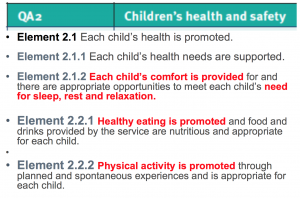Most experts agree that children between 5 and 12 need about 10 hours, even 11 hours of sleep per night – children under 5 should be aiming for 10 to 12 hours of sleep each night as well as a nap or at the very least some quality rest time during the day.
As much as we tend to realise that the body needs sleep to physically rejuvenate us it also helps children to grow and assists the immune system. Our brains also rely on sleep to function properly – researchers often say that they believe the brain uses sleep to sort through information, solve problems, organise your thoughts and generally restore itself. It is safe to say that fulfilling the sleep and rest quota each day for children is imperative to their overall ability to function, both physically and mentally. It’s not surprising that children who don’t get enough sleep or rest time can be irritable and struggle to concentrate and perhaps feel clumsy.
Educators should remember that the National Quality Standards Quality Area 2, Element 2.1.2 specifically refers to centres making sure that “each child’s comfort is provided for and there are appropriate opportunities to meet each child’s need for sleep, rest and relaxation, which in turn directly supports Element 2.1 as a whole – promoting the health of the children. (See below from NQS Quality Areas).
The amount of sleep different children require is, as with adults, an individual thing. There should, however, still be an emphasis on ensuring that children are sleeping enough, resting enough and that these are quality sleeps and rests to maximise what your child/ren can get out of every day.
We all know that sometimes it can be a challenge to get children to sleep, but there are ways that you can make it easier for children:
-Keep up a regular routine where children can come to understand that rest or sleep time is approaching. Routine can help children mentally and physically prepare;
-Try some relaxation exercises or reading a book in the lead up;
-Make sure children get ample fresh air and physical activity;
-Ensure children are comfortable and not hungry, thirsty etc before they settle down to rest/sleep.
It is so important to remember that even if children are sleeping well overnight, a day nap is necessary right up until about the age of 3. While some 4 and 5-year old children may still take a short nap during the day, many don’t, but they should be having periods of rest and relaxation to maintain those high energy levels all day long.
You can find more information and tips about children and naps from the Victorian government website Better Health here: http://www.betterhealth.vic.gov.au/bhcv2/bhcarticles.nsf/pages/Sleep_children_and_naps?open
If you’d like to read more about different types of sleep and sleep across different ages, you may like to visit: http://sleepfoundation.org/sleep-topics/children-and-sleep.
Don’t forget to look at your own sleep patterns too – even adults can improve the way we function in our daily lives simply from ensuring we get a decent amount of sleep and that it’s quality sleep and rest. After all, you need all the energy you can muster to keep up with the kids!
Selecting the Perfect Childcare Service for Your Child: A Guide for Parents
As parents, the decision to place your child in childcare is significant. Not to mention choosing the right service for your child. Of course you want to ensure that your child is in a safe, nurturing environment where they can…
Read More





